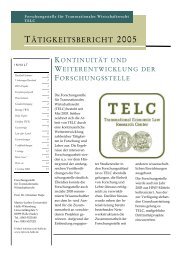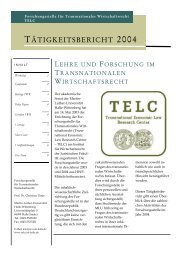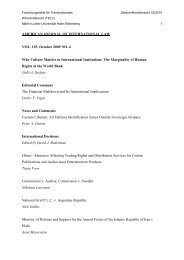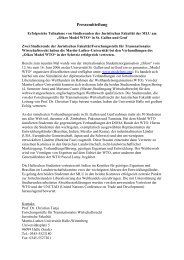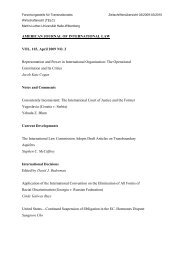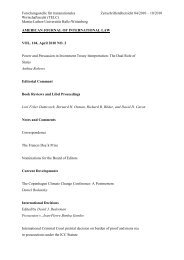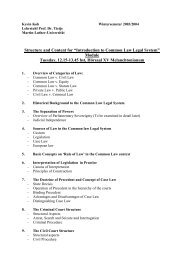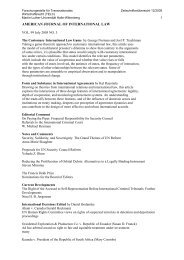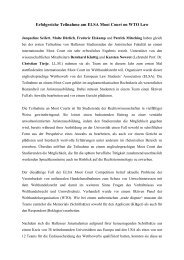Myth or Reality? China's Market Economy Status under WTO Anti ...
Myth or Reality? China's Market Economy Status under WTO Anti ...
Myth or Reality? China's Market Economy Status under WTO Anti ...
- No tags were found...
You also want an ePaper? Increase the reach of your titles
YUMPU automatically turns print PDFs into web optimized ePapers that Google loves.
Policy Papers on Transnational Economic Law No. 34Policy Papers onTransnational Economic LawNo. 34<strong>Myth</strong> <strong>or</strong> <strong>Reality</strong>?China’s <strong>Market</strong> <strong>Economy</strong><strong>Status</strong> <strong>under</strong> <strong>WTO</strong><strong>Anti</strong>-Dumping Law after 2016Christian Tietje/Karsten NowrotT RANSNATIONALE CONOMIC LAWRESEARCH CENTERSchool of LawMartin-Luther-UniversityHalle-WittenbergUniversitätsplatz 506099 Halle (Saale)GermanyTel.: +49 345 / 55 23149/ 55 23180Fax: +49 345 / 55 27201E-Mail:telc@jura.uni-halle.dewww.telc.uni-halle.deDecember 2011
Policy Papers on Transnational Economic Law No. 34<strong>Myth</strong> <strong>or</strong> <strong>Reality</strong>? China’s <strong>Market</strong><strong>Economy</strong> <strong>Status</strong> <strong>under</strong> <strong>WTO</strong><strong>Anti</strong>-Dumping Law after 2016I. IntroductionCurrently, a considerable number of<strong>WTO</strong> members still categ<strong>or</strong>ize thePeople’s Republic of China politicallyand legally as a so called Non-<strong>Market</strong> <strong>Economy</strong> (NME) becauseupon its <strong>WTO</strong> accession on 11 December2001 and still as of today,these members perceived and perceivethat the Chinese economy operates<strong>under</strong> intensive governmentalcontrol. China’s status as a NMEcauses regularly political tension betweenChina and its main tradingpartners. Indeed, the NMEquestionis – next to the arms embargothat was imposed on Chinaafter the events of 1989 – the singlemost imp<strong>or</strong>tant issue in the traderelations of China and with China.This is somehow surprising from astrict legal perspective because thereis only one area of trade law inwhich the NME-status has the<strong>or</strong>eticaland practical significance: antidumpinglaw. However, once onerealizes that in the last five yearsm<strong>or</strong>e than one-third of all newlyinitiated antidumping investigationsaround the w<strong>or</strong>ld have imp<strong>or</strong>tsfrom China as a target (see, e.g.,<strong>WTO</strong> Statistics on <strong>Anti</strong>dumping2011), one gets an idea on whyChina is so keen on having changedits <strong>WTO</strong> status from NME to marketeconomy (MES).In light of the fact that in particularalso the US and the EU are currentlynot willing to grant China MES,a lot of attention is paid to somespecific provisions in the accessionprotocol of China to the <strong>WTO</strong>dealing with, as it seems, an automaticexpiry of the NME-status ofChina in 2016. Until recently, the“automatic” shift of China fromNME to MES in 2016 was taken asgranted by scholars and governmentsaround the w<strong>or</strong>ld (see, e.g.,Andersen, 2009: 294 et seq.; C<strong>or</strong>nelis,2007: 105 et seq.; Detlof/Fridh,2007: 279). This overwhelminglyshared perception has m<strong>or</strong>e recentlybeen challenged by Bernard O’Conn<strong>or</strong>(O’Conn<strong>or</strong>, 2011) arguing that“[t]here is no provision setting anydate in the <strong>WTO</strong> agreements themselvesand there is no deadline in theprotocol signed by China when itacceded to the <strong>WTO</strong>. The idea thatthere is a deadline is an urban myththat seems to have gone global. ItPage 2
Policy Papers on Transnational Economic Law No. 34has gone viral even in a w<strong>or</strong>ld werethe <strong>under</strong>lying agreements are freelyavailable to all on the Internet”.Against this background, the presentanalysis takes up the discussionon the NME-status of China andthe “myth” of 2016. The main purposeof this contribution is to leavepolitical rhet<strong>or</strong>ic aside and to analyzethe situation from a legal perspectivein <strong>or</strong>der to make the entireproblem m<strong>or</strong>e transparent to thosenot so familiar with antidumpinglaw. In this connection, the auth<strong>or</strong>swill first discuss the characteristicsof NME-status of a <strong>WTO</strong> memberin antidumping law in general. Second,the specific provisions of China’saccession protocol concerningNME-status and the “myth” of2016 will be analyzed. Third, consequencesand options f<strong>or</strong> the timeafter 11 December 2016 will behighlighted.II. Background: MES andNME-<strong>Status</strong> in <strong>WTO</strong> Law<strong>WTO</strong> law does not know any provisionthat contains the notion ofMES <strong>or</strong> NME-status. However, therationale f<strong>or</strong> classifying a <strong>WTO</strong>member as a market economy <strong>or</strong> anon-market economy becomes clearif one recalls some basic facts aboutantidumping law. Acc<strong>or</strong>ding to Art.2.1 <strong>Anti</strong>dumping Agreement(<strong>WTO</strong> ADA), “dumping” meansthe introduction of a product “intothe commerce of another country atless than its n<strong>or</strong>mal value”. “N<strong>or</strong>malvalue” in this regard is defined as“the comparable price, in the <strong>or</strong>dinarycourse of trade, f<strong>or</strong> the likeproduct when destined f<strong>or</strong> consumptionin the exp<strong>or</strong>ting country”.Thus, the “<strong>or</strong>dinary course of trade”is essential f<strong>or</strong> the entire concept ofdumping and antidumping duties.The idea behind the notion of“<strong>or</strong>dinary course of trade” is to beactually able to compare two markets/countriesin <strong>or</strong>der to determinewhether there is “fair” <strong>or</strong> “unfair”competition between imp<strong>or</strong>ted anddomestic products. In this sense,comparability in the sense of an“<strong>or</strong>dinary course of trade” in theexp<strong>or</strong>ting and the imp<strong>or</strong>ting countryrequires that both countries aremarket economies. However, aseconomic and political realityaround the w<strong>or</strong>ld is m<strong>or</strong>e diverse inthe sense that there are both marketand non-market economies, antidumpinglaw has to deal with situationsin which imp<strong>or</strong>ts from a nonmarketeconomy are at stake.Page 3
Policy Papers on Transnational Economic Law No. 34<strong>WTO</strong> law knows two different waysof how to deal with non-marketeconomies in antidumping law. Thefirst situation is described in the secondAd Note to Art. VI:1 of theGATT 1994:“It is recognized that, in thecase of imp<strong>or</strong>ts from a countrywhich has a complete <strong>or</strong>substantially complete monopolyof its trade and whereall domestic prices are fixedby the State, special difficultiesmay exist in determiningprice comparability f<strong>or</strong> thepurposes of paragraph 1, andin such cases imp<strong>or</strong>ting contractingparties may find itnecessary to take into accountthe possibility that astrict comparison with domesticprices in such a countrymay not always be appropriate”.This provision, which was introducedinto the GATT 1947 in theyear 1955 (BISD 3S/222, at 223,para. 6; see also, e.g., Snyder, 2001:380 et seq.; Polouektov, 2002: 6 etseq.), essentially opens up the possibilitiesto determine n<strong>or</strong>mal value ofproducts by using methodology asdeemed appropriate by the investigatingcountry. Usually, imp<strong>or</strong>tingcountries use the “surrogate” <strong>or</strong>“analogue” country method in <strong>or</strong>derto determine n<strong>or</strong>mal value concerningimp<strong>or</strong>ts from a non-marketeconomy (see, e.g., Art. 2 (7) (a) EUBasic <strong>Anti</strong>dumping Regulation1225/2009; and thereto EU – <strong>Anti</strong>-Dumping Measures on Certain Footwearfrom China, Panel Rep<strong>or</strong>t of28 October 2011, WT/DS405/R,paras. 7.227 et seq.). This possibilityprovided f<strong>or</strong> by the second Ad Noteto Art. VI:1 of the GATT 1994 hasbeen inc<strong>or</strong>p<strong>or</strong>ated in the <strong>WTO</strong>ADA (see Art. 2 (7) ADA) (EC –Definitive <strong>Anti</strong>-Dumping Measureson Certain Iron <strong>or</strong> Steel Fastenersfrom China, AB Rep<strong>or</strong>t of 15 July2011, WT/DS397/AB/R, para.285).It is imp<strong>or</strong>tant to draw attention tothe fact that the wide discretion enjoyedby the imp<strong>or</strong>ting country onhow to determine n<strong>or</strong>mal valuewith regard to imp<strong>or</strong>ts from a nonmarketeconomy essentially dependson a general determination that therespective exp<strong>or</strong>ting country is notentitled to legal treatment as laiddown in Art. 2 (1) <strong>WTO</strong> ADA.This is possible only by either makinga general determination of a non-market economy in the sense of thesecond Ad Note to Art. VI:1 GATT1994 <strong>or</strong> by having a specific provisionin this regard in a respective<strong>WTO</strong> accession protocol. If none ofPage 4
Policy Papers on Transnational Economic Law No. 34these two options is available <strong>or</strong> given,the only remaining deviationfrom a “n<strong>or</strong>mal” determination ofn<strong>or</strong>mal value is provided f<strong>or</strong> in Art.2.2. <strong>WTO</strong> ADA. Making a respectiveassessment on the existence of aparticular market situation <strong>under</strong>this provision, however, is only possiblewith regard to a specific antidumpinginvestigation and thus requiresan evaluation on a case-bycasebasis.III.“Let there be Light”: Evaluatingthe Relevant Provisionsin China’s <strong>WTO</strong>Accession ProtocolIn principle, Art. VI of GATT 1994as well as the provisions of the<strong>WTO</strong> ADA are also currently applicableto antidumping proceedingsinitiated by <strong>WTO</strong> members againstimp<strong>or</strong>ts from China. Nevertheless,the respective general legal regime issubject to imp<strong>or</strong>tant modificationson the basis of the relevant stipulationsenshrined in China’s accessionprotocol that constitutes an integralpart of the <strong>WTO</strong> Agreement (seeParagraph 1(2) of the AccessionProtocol; China – Measures Relatedto the Exp<strong>or</strong>tation of Various RawMaterials, Panel Rep<strong>or</strong>t of 5 July2011, WT/DS394/R, WT/DS395/R, WT/DS398/R, paras. 7.113 etseq.). Reflecting concerns voiced byseveral members of the w<strong>or</strong>king partyon the accession of China(Rep<strong>or</strong>t of the W<strong>or</strong>king Party, para.150), paragraph 15(a) of the accessionprotocol reads as follows:“15. Price Comparability inDetermining Subsidies andDumpingArticle VI of the GATT1994, the Agreement on Implementationof Article VI ofthe General Agreement onTariffs and Trade 1994("<strong>Anti</strong>-Dumping Agreement")and the SCM Agreementshall apply in proceedingsinvolving imp<strong>or</strong>ts ofChinese <strong>or</strong>igin into a <strong>WTO</strong>Member consistent with thefollowing:(a) In determining pricecomparability <strong>under</strong> ArticleVI of the GATT 1994 andthe <strong>Anti</strong>-Dumping Agreement,the imp<strong>or</strong>ting <strong>WTO</strong>Member shall use either Chineseprices <strong>or</strong> costs f<strong>or</strong> theindustry <strong>under</strong> investigation<strong>or</strong> a methodology that is notbased on a strict comparisonwith domestic prices <strong>or</strong> costsin China based on the followingrules:(i) If the producers <strong>under</strong>investigation can clearlyshow that market economyconditions prevail in the industryproducing the likePage 5
Policy Papers on Transnational Economic Law No. 34product with regard to themanufacture, productionand sale of that product, theimp<strong>or</strong>ting <strong>WTO</strong> Membershall use Chinese prices <strong>or</strong>costs f<strong>or</strong> the industry <strong>under</strong>investigation in determiningprice comparability;(ii) The imp<strong>or</strong>ting <strong>WTO</strong>Member may use a methodologythat is not based on astrict comparison with domesticprices <strong>or</strong> costs in Chinaif the producers <strong>under</strong>investigation cannot clearlyshow that market economyconditions prevail in the industryproducing the likeproduct with regard to manufacture,production and saleof that product.”This provision itself does not explicitlybestow NME-status on China.Nevertheless, it is precisely this regulationthat, at present, essentiallypermits other <strong>WTO</strong> members todeviate from the requirements ofArt. 2 (1) <strong>WTO</strong> ADA when determiningthe n<strong>or</strong>mal value of imp<strong>or</strong>tedproducts. Thus, it basically subjectsgoods of Chinese <strong>or</strong>igin to thesame treatment as imp<strong>or</strong>ts fromNME countries in the sense of thealready mentioned second Ad Noteto Art. VI:1 GATT 1994 (see alsoEC – Definitive <strong>Anti</strong>-DumpingMeasures on Certain Iron <strong>or</strong> SteelFasteners from China, AB Rep<strong>or</strong>t of15 July 2011, WT/DS397/AB/R,para. 287). Compared to this generalprovision, however, the accessionprotocol grants already currentlyChinese producers insofar a m<strong>or</strong>efav<strong>or</strong>able status as paragraph 15(a)(i) provides them with the option ofproving that market economy conditionsprevail in the respective industry,thereby potentially givingrise to a valid claim f<strong>or</strong> industrywidemarket economy treatment; aprocedure to be distinguished fromindividual market economy treatment(MET) such as f<strong>or</strong> exampleprovided f<strong>or</strong> in Art. 2 (7) (b) EUBasic <strong>Anti</strong>dumping Regulation1225/2009 (see also EU – <strong>Anti</strong>-Dumping Measures on Certain Footwearfrom China, Panel Rep<strong>or</strong>t of28 October 2011, WT/DS405/R,para. 7.194).Aside from this surely notable variation,the finding that China can <strong>under</strong>paragraph 15(a) of the accessionprotocol essentially be regarded as aNME is further confirmed by thew<strong>or</strong>ding of the first and the thirdsentence of paragraph 15(d) thatreads as follows:“(d) Once China has established,<strong>under</strong> the nationallaw of the imp<strong>or</strong>ting <strong>WTO</strong>Member, that it is a marketPage 6
Policy Papers on Transnational Economic Law No. 34economy, the provisions ofsubparagraph (a) shall be terminatedprovided that theimp<strong>or</strong>ting Member's nationallaw contains market economycriteria as of the date ofaccession. In any event, theprovisions of subparagraph(a)(ii) shall expire 15 yearsafter the date of accession. Inaddition, should China establish,pursuant to the nationallaw of the imp<strong>or</strong>ting<strong>WTO</strong> Member, that marketeconomy conditions prevailin a particular industry <strong>or</strong>sect<strong>or</strong>, the non-market economyprovisions of subparagraph(a) shall no longer applyto that industry <strong>or</strong> sect<strong>or</strong>.”This last mentioned provision leadsalso already to the issue of China’sstatus <strong>under</strong> <strong>WTO</strong> antidumpinglaw from 11 December 2016 onwards.The second sentence of paragraph15(d), stipulating that “theprovisions of subparagraph (a)(ii)shall expire 15 years after the date ofaccession”, has so far conventionallybeen interpreted as resulting in thealready mentioned “automatic” shiftof China from MNE to MES on 11December 2016. Verifying <strong>or</strong> falsifyingthis perception requires a verycareful reading of the respective provisionswith due regard to the overarchingsystematic conception of<strong>WTO</strong> antidumping law as a whole.Again, this second sentence of paragraph15(d) of the accession protocolitself does not explicitly grantChina MES from that “magic” dateonwards. However, with paragraph15(a)(ii) expiring, it essentially createsa situation where other <strong>WTO</strong>members are no longer permitted to“use a methodology that is notbased on a strict comparison withdomestic prices <strong>or</strong> costs in China”when determining the n<strong>or</strong>mal valueof imp<strong>or</strong>ts of Chinese <strong>or</strong>igin andthus to deviate from the requirementsof Art. 2 (1) <strong>WTO</strong> ADA bytaking recourse to China’s accessionprotocol. Consequently, from 11December 2016 onwards it is m<strong>or</strong>e<strong>or</strong> less exclusively the general regimeon <strong>WTO</strong> antidumping law, as laiddown in Art. VI of GATT 1994and the <strong>WTO</strong> ADA, that applies toChina and imp<strong>or</strong>ts <strong>or</strong>iginating fromit.This finding, however, should notprematurely lead to the conclusionthat from this date onwards Chinais from a legal perspective quasi automaticallyand necessarily enjoyingthe benefits of MES f<strong>or</strong> an indefiniteperiod of time <strong>or</strong> even permanently.Quite to the contrary, al-Page 7
Policy Papers on Transnational Economic Law No. 34ready a careful reading of the accessionprotocol itself reveals that thepossibility of China being qualifiedby some <strong>WTO</strong> members as a NMEafter 11 December 2016 has alreadybeen anticipated and addressed atthe time of accession.What is frequently overlooked <strong>or</strong>disregarded (see, e.g., EC – Definitive<strong>Anti</strong>-Dumping Measures on CertainIron <strong>or</strong> Steel Fasteners from China,AB Rep<strong>or</strong>t of 15 July 2011,WT/DS397/AB/R, para. 290) is theimp<strong>or</strong>tant fact that the second sentenceof paragraph 15(d) only stipulatesthe expiring of “the provisionsof subparagraph (a)(ii)”, thus retainingthe applicability of subparagraph(a)(i) even after 11 December2016. With regard to its materialscope of application, however, thisparagraph 15(a)(i), providing thebasis f<strong>or</strong> a claim by Chinese producersto industry-wide market economytreatment, exclusively addressesa situation where China is by atleast one other <strong>WTO</strong> member qualifiedas a NME. Considering thewell-recognized rule that the interpretationof a treaty must givemeaning and effect to all of itsclauses and is, thus, not free to reduceindividual provisions to inutility(see, e.g., US – Standards of Ref<strong>or</strong>mulatedand Conventional Gasoline,AB Rep<strong>or</strong>t of 29 April 1996,WT/DS2/AB/R, 23; Japan – Taxeson Alcoholic Beverages, AB Rep<strong>or</strong>t of4 October 1996, WT/DS8/AB/R,WT/DS10/AB/R, WT/DS11/AB/R, 12; Van Damme, 2009: 275 etseq.), the only legally sound conclusionpossibly to be drawn from thecontinued validity of paragraph 15(a)(i) after 11 December 2016 is theat least the<strong>or</strong>etical possibility ofChina being considered as a NMEby some other <strong>WTO</strong> members afterthis “magic” date.This finding is further supp<strong>or</strong>ted bya comparative evaluation of the secondsentence of paragraph 15(d)on one side and the first as well asthe third sentence of this provisionon the other. Whereas the two lastmentioned stipulations rightly andconsequently provide f<strong>or</strong> a terminationof the “non-market economyprovisions of subparagraph (a)” as awhole once China has establishedthat it is a market economy (firstsentence) <strong>or</strong> that market economyconditions prevail at least with regardto a particular industry <strong>or</strong> sect<strong>or</strong>(third sentence), the m<strong>or</strong>e limitedtermination <strong>under</strong> the secondsentence has to be <strong>under</strong>stood asintentionally retaining a m<strong>or</strong>e fav<strong>or</strong>-Page 8
Policy Papers on Transnational Economic Law No. 34able status f<strong>or</strong> Chinese producers inthe case that China will again beconsidered by some other <strong>WTO</strong>members as a NME after 11 December2016.In light of these findings, it thus appears– at least from a the<strong>or</strong>eticallegal perspective – in principle verywell admissible that some other<strong>WTO</strong> members qualify China as aNME even after the date providedf<strong>or</strong> in the second sentence of paragraph15(d) of the accession protocol.However, three legal aspects arew<strong>or</strong>th drawing attention to in thisconnection.First, the second sentence of paragraph15(d) incontrovertibly illustratesthat such a qualification as anNME can no longer find its legalbasis in China’s accession protocolafter 11 December 2016.Second, in light of the overarchingsystematic approach adopted bygeneral <strong>WTO</strong> antidumping law,being from that date onwards them<strong>or</strong>e <strong>or</strong> less exclusive legal regimeapplicable to China, it is – in thesame way as all other <strong>WTO</strong> members– presumed to have acquiredMES. Consequently, it might verywell be argued that, at least f<strong>or</strong> a socalled“logical” <strong>or</strong> “juridical” second,China has on 11 December2016 to be regarded as havingachieved MES erga omnes. Thus, ifonly in this limited sense, there isindeed a certain automatism involvedin this regard.Third, a subsequent – renewed –qualification of China as a NME byother <strong>WTO</strong> members, in <strong>or</strong>der tobe legally sustainable, has to find itsbasis in the general regime on <strong>WTO</strong>antidumping law as laid down inArt. VI of GATT 1994 and the<strong>WTO</strong> ADA. In light of the backgroundobservations as outlined inthe previous section, this essentiallyrequires that the <strong>WTO</strong> member inquestion has to argue and prove thatthe requirements stipulated in thesecond Ad Note to Art. VI:1 GATT1994 are fulfilled with regard toeconomic conditions prevailing inChina at the time when respectiveantidumping proceedings are initiated.IV. Consequences f<strong>or</strong> the <strong>Status</strong>of China after 11 December2016: Two Possible ScenariosThe main consequence of the legalsituation described is clear. Until 11December 2016, <strong>WTO</strong> MembersPage 9
Policy Papers on Transnational Economic Law No. 34may treat China with regard to thedetermination of n<strong>or</strong>mal value inantidumping proceedings as a nonmarketeconomy without any furtherjustification. However, this willchange after 11 December 2016. AsChina will, at least f<strong>or</strong> a logical second,enjoy MES on 11 December2016, the burden of proof shifts toother <strong>WTO</strong> members to establishthat – as an exception – the prerequisitesof the second Ad Note toArt. VI:1 GATT 1994 are fulfilled.This, however, will probably be almostimpossible to prove in practice.It is w<strong>or</strong>th recalling in this regardwhat the Appellate Body recentlysaid in EC – Fasteners (WT/DS397/AB/R):We observe that the secondAd Note to Article VI:1 refersto a “country which hasa complete <strong>or</strong> substantiallycomplete monopoly of itstrade" and "where all domesticprices are fixed by theState". This appears to describea certain type ofNME, where the State monopolizestrade and sets alldomestic prices. The secondAd Note to Article VI:1would thus not on its face beapplicable to lesser f<strong>or</strong>ms ofNMEs that do not fulfilboth conditions, that is, thecomplete <strong>or</strong> substantiallycomplete monopoly of tradeand the fixing of all prices bythe State. (para. 285, footnote460).This statement of the AppellateBody, even though obiter dictumand merely included in a footnote,<strong>under</strong>lines what follows alreadyfrom the clear w<strong>or</strong>ding of the secondAd Note to Article VI:1GATT 1994: the provision can onlybe invoked concerning a <strong>WTO</strong>Member that monopolizes trade intotal and where all prices are set bythe government. It seems doubtfulwhether this high threshold couldever be proven with regard to anycurrent and future <strong>WTO</strong> member(see also, e.g., Yan, 2010: 162 etseq.; Hoogmartens, 2004: 145).Nevertheless, should, e.g., the EU<strong>or</strong> the US with effect on 11 December2016 make a determination acc<strong>or</strong>dingto the second Ad Note toArt. VI:1 GATT 1994, the industry-wide market economy treatmentprovided f<strong>or</strong> in paragraph 15(a)(i)of the accession protocol remainsvalid. As already indicated, this provisiondoes not expire on 11 December2016.If no determination in the sense ofthe second Ad Note to Art. VI:1Page 10
Policy Papers on Transnational Economic Law No. 34GATT 1994 is made, the only remainingpossibility to treat imp<strong>or</strong>tsfrom China different than thosefrom other <strong>WTO</strong> Members in antidumpingproceeding concerning thedetermination of n<strong>or</strong>mal value is t<strong>or</strong>efer to and prove a “particular marketsituation” in the sense of Art.2.2. <strong>WTO</strong> ADA.V. ConclusionF<strong>or</strong> lawyers and governmental officialsdealing with anti-dumping lawand practice, the 11 December2016 is certainly not a myth – it isreality. From that date onwards, itwill be almost impossible – at leastfrom the perspective of <strong>WTO</strong> law –to make a determination of the n<strong>or</strong>malvalue of products targeted by anantidumping proceeding on the basesof analogous third countrymethodology. The only possibilityto do so would be to make a positive,explicit determination of China’sNME-status based on the secondAd Note to Art. VI:1 GATT1994. However, taking into accountthe high threshold stipulated in thesecond Ad Note to Art. VI:1 GATT1994, chances to convincingly andthus successfully do so are almostnon-existing. Theref<strong>or</strong>e, from 11December 2016 onwards Chineseimp<strong>or</strong>ts have to be treated with regardto a determination of n<strong>or</strong>malvalue in the same way as imp<strong>or</strong>tsfrom any other <strong>WTO</strong> member.ReferencesAndersen, Henrik, EU DumpingDeterminations and <strong>WTO</strong>Law, Alphen aan den Rijn etal. 2009.C<strong>or</strong>nelis, J<strong>or</strong>is, China’s Quest f<strong>or</strong><strong>Market</strong> <strong>Economy</strong> <strong>Status</strong> andits Impact on the Use of TradeRemedies by the EuropeanCommunities and the UnitedStates, Global Trade and CustomsJournal 2 (2007), 105-115.Detlof, Helena/Fridh, Hilda, TheEU Treatment of Non-<strong>Market</strong><strong>Economy</strong> Countries in <strong>Anti</strong>-Dumping Proceedings, GlobalTrade and Customs Journal 2(2007), 265-281.Hoogmartens, Jan, EC Trade Lawfollowing China’s Accession tothe <strong>WTO</strong>, The Hague 2004.O’Conn<strong>or</strong>, Bernard, <strong>Market</strong>-<strong>Economy</strong> <strong>Status</strong> f<strong>or</strong> China isnot Automatic, 27 November2011, available <strong>under</strong>: .Polouektov, Alexander, Non-<strong>Market</strong><strong>Economy</strong> Issues in the <strong>WTO</strong><strong>Anti</strong>-Dumping Law and AccessionNegotiations – Revivalof a Two-tier Membership?,Journal of W<strong>or</strong>ld Trade 36(2002), 1-37.Snyder, Francis, The Origins of thePage 11
Policy Papers on Transnational Economic Law No. 34‘Nonmarket <strong>Economy</strong>’: Ideas,Pluralism and Power in EC<strong>Anti</strong>-Dumping Law aboutChina, European Law Journal7 (2001), 369-434.Van Damme, Isabelle, Treaty Interpretationby the <strong>WTO</strong> AppellateBody, Oxf<strong>or</strong>d/New Y<strong>or</strong>k2009.<strong>WTO</strong>, Statistics on <strong>Anti</strong>-DumpingInitiations 1995 to 2010,available <strong>under</strong>: .<strong>WTO</strong>, European Union – <strong>Anti</strong>-Dumping Measures on CertainFootwear from China, PanelRep<strong>or</strong>t of 28 October 2011,WT/DS405/R.<strong>WTO</strong>, European Communities – Definitive<strong>Anti</strong>-DumpingMeasures on Certain Iron <strong>or</strong>Steel Fasteners from China, ABRep<strong>or</strong>t of 15 July 2011, WT/DS397/AB/R.<strong>WTO</strong>, China – Measures Related tothe Exp<strong>or</strong>tation of Various RawMaterials, Panel Rep<strong>or</strong>t of 5July 2011, WT/DS394/R,WT/DS395/R, WT/DS398/R.<strong>WTO</strong>, Accession of the People’sRepublic of China, Decisionof 10 November 2001, <strong>WTO</strong>Doc. WT/L/432 of 23 November2001.<strong>WTO</strong>, Rep<strong>or</strong>t of the W<strong>or</strong>king Partyon the Accession of China,<strong>WTO</strong> Doc. WT/ACC/CHN/49 of 1 October 2001.<strong>WTO</strong>, Japan – Taxes on AlcoholicBeverages, AB Rep<strong>or</strong>t of 4 October1996, WT/DS8/AB/R,WT/DS10/AB/R, WT/DS11/AB/R.<strong>WTO</strong>, United States – Standards ofRef<strong>or</strong>mulated and ConventionalGasoline, AB Rep<strong>or</strong>t of 29April 1996, WT/DS2/AB/R.Yan, Luo, <strong>Anti</strong>-Dumping in the<strong>WTO</strong>, the EU and China,Austin et al. 2010.Prof. Dr. Christian Tietje, LL.M.(Michigan) is Direct<strong>or</strong> of the Instituteof Economic Law as well as of theTransnational Economic Law ResearchCenter (TELC) and holds theChair f<strong>or</strong> Public Law, European Lawand International Economic Law atthe Faculty of Law, Economics andBusiness of the Martin Luther UniversityHalle-Wittenberg.Dr. Karsten Nowrot, LL.M.(Indiana) is seni<strong>or</strong> lecturer and researcherat the Transnational EconomicLaw Research Center (TELC)at the Faculty of Law, Economics andBusiness of the Martin Luther UniversityHalle-Wittenberg.The auth<strong>or</strong>s would like to thank ValerieA. Davis f<strong>or</strong> her supp<strong>or</strong>t and veryvaluable comments on earlier versionsof this paper.Page 12



